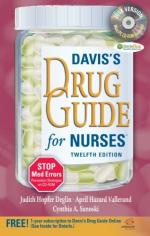|
This section contains 365 words (approx. 2 pages at 300 words per page) |
As a therapeutic agent, a drug is any substance, other than food, used in the prevention, diagnosis, alleviation, treatment, or cure of disease. It is also a general term for any substance, stimulating or depressing, that can be habituating. According to the U.S. Food, Drug, and Cosmetic Act, a drug is (1) a substance recognized in an official pharmacopoeia or formulary; (2) a substance intended for use in the diagnosis, cure, mitigation, treatment, or prevention of disease; (3) a substance other than food intended to affect the structure or function of the body; (4) a substance intended for use as a component of a medicine but not a device or a component, part, or accessory of a device.
Pharmacologists consider a drug to be any molecule that, when introduced into the body, affects living processes through interactions at the molecular level. Hormones can be considered to be drugs, whether they are administered from outside the body or their release is stimulated endogenously. Although drug molecules vary in size, the molecular weight of most drugs falls within the range of 100-1,000, since to be a drug it must be absorbed and distributed to a target organ. Efficient absorption and distribution may be more difficult when drugs have a molecular weight greater than 1,000. The drug's molecular shape is also important, since most drugs interact with specific RECEPTORS to produce their biological effects. The shape of the receptor determines which drug molecules are capable of binding. The shape of the drug molecule must be complementary to that of the receptor to produce an optimal fit and, therefore, a physiological response.
Within this general definition, most POISONS would be considered to be drugs. Although water and oxygen technically fit this general definition and are used therapeutically and discussed in pharmacology textbooks, they are rarely considered to be drugs. Efforts have been made to develop a more restricted definition, but because so many molecules and substances can affect living tissue, it is difficult to draw a sharp line.
See Also
Inhalants; Plants, Drugs From; Vitamins)
Bibliography
HARDMAN, J. G., ET AL. (EDS.). (1996). The pharmacological basis of theraupeutics, 9th ed. New York: Mcgraw-Hill.
STEDMAN ' MEDICAL DICTIONARY. (1992). 27th ed. Baltimore, MD: Lippincott, Williams, & Wilkins.
|
This section contains 365 words (approx. 2 pages at 300 words per page) |


